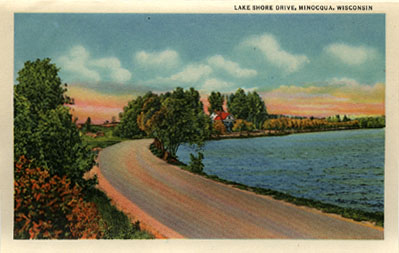 Northwoods Vacationland Album |
Promoting Happier Living Through Fond Memories ... Site Map |
|
 Northwoods Vacationland Album |
Promoting Happier Living Through Fond Memories ... Site Map |
|
|
Dr. Torpy Lakeland's Beloved Doctor
|
 Minocqua postcard circa 1950 The name Minocqua is said to be derived from the Chippewa Indian word "Ninocqua," meaning "noon-day rest." The island is believed to have been the area Native Americans camped at during their travels. Other legends say the name came from Chippewa Indian Chief Noc Wib or Minocquip who lived on the island with his followers. The history of Minocqua is rich in logging lore. When early settlers arrived in Wisconsin, virgin forests with mammoth, hundred-year-old trees covered nearly 90 percent of the state. The vast wonderland was viewed as an inexhaustible forest by loggers arriving at the turn of the nineteenth century to harvest the wealth of timber. Logging boom towns cropped up everywhere. In 1887 when Chicago, Milwaukee, St.Paul and Pacific Railroad Companies forged their way to the northern most regions of the state, Maniwaki sprang up as a major logging town. It was formally established on March 13, 1889. In 1891 the town consisted of 29 saloons, two hotels, two general stores, a small market and about 15 homes. Lumberjacks could be seen everywhere, especially in the saloons, frequently drinking until their paychecks were gone. There are interesting tales of surgery performed in the saloons by the famed Dr. Thomas Torpy after whom Torpy Park is named. The lumberjacks worked feverishly through the winter months, reaping as much timber as possible until the spring thaw when the logs were sent south to the mills. In the 10-year period between 1890 and 1900 loggers cut nearly all of the pine and hardwood forest of the north. As the logging industry dwindled the resort industry began and the railroads were used to bring visitors by the hundreds seeking the plentiful fish that swam in the beautiful lakes and the abundant recreational opportunities in the area. A "Fisherman's Special" weekend excursion was established and the Northwoods Hiawatha brought up eager fishermen during the week. Businesses prospered as more and more people found the area a delightful place to live. The businesses were originally established on Front Street which was the main street of town in the early 1900's, but in 1912 a devastating fire leveled most of them. The fire started at the Lakeside Hotel at the corver of Front and Flambeau streets, across from today's post office. A group of men tried to stop the fire by setting dynamite, but their plan failed and 14 buildings burned to the ground including the Lakeside Hotel, a general store, meat market, restaurant and the opera house. The estimated damages was $110,000 a staggering amount in those days. Some of the business owners rebuilt at their former sites, but most of the regrowth was on Oneida Street, the main street of town today. Many of the later buildings remain today and blue historical signs are posted in front of those buildings. Others have been remodeled, but are all remnants of the early days of Maniwaki. Minocqua celebrated its Centennial in 1988, as did Woodruff. Today Minocqua (often referred to as part of the Lakeland area) is a flourishing tourist destination, with a variety of accommodations from rustic cabins to luxurious condominium suites, campgrounds to bed & breakfasts, fine dining, unique shopping, abundant outdoor recreation, attractions and historical museums. It has one of the largest concentrations of fresh water bodies in the world, providing endless outdoor recreational opportunities for four seasons of fun in the Northwoods. |